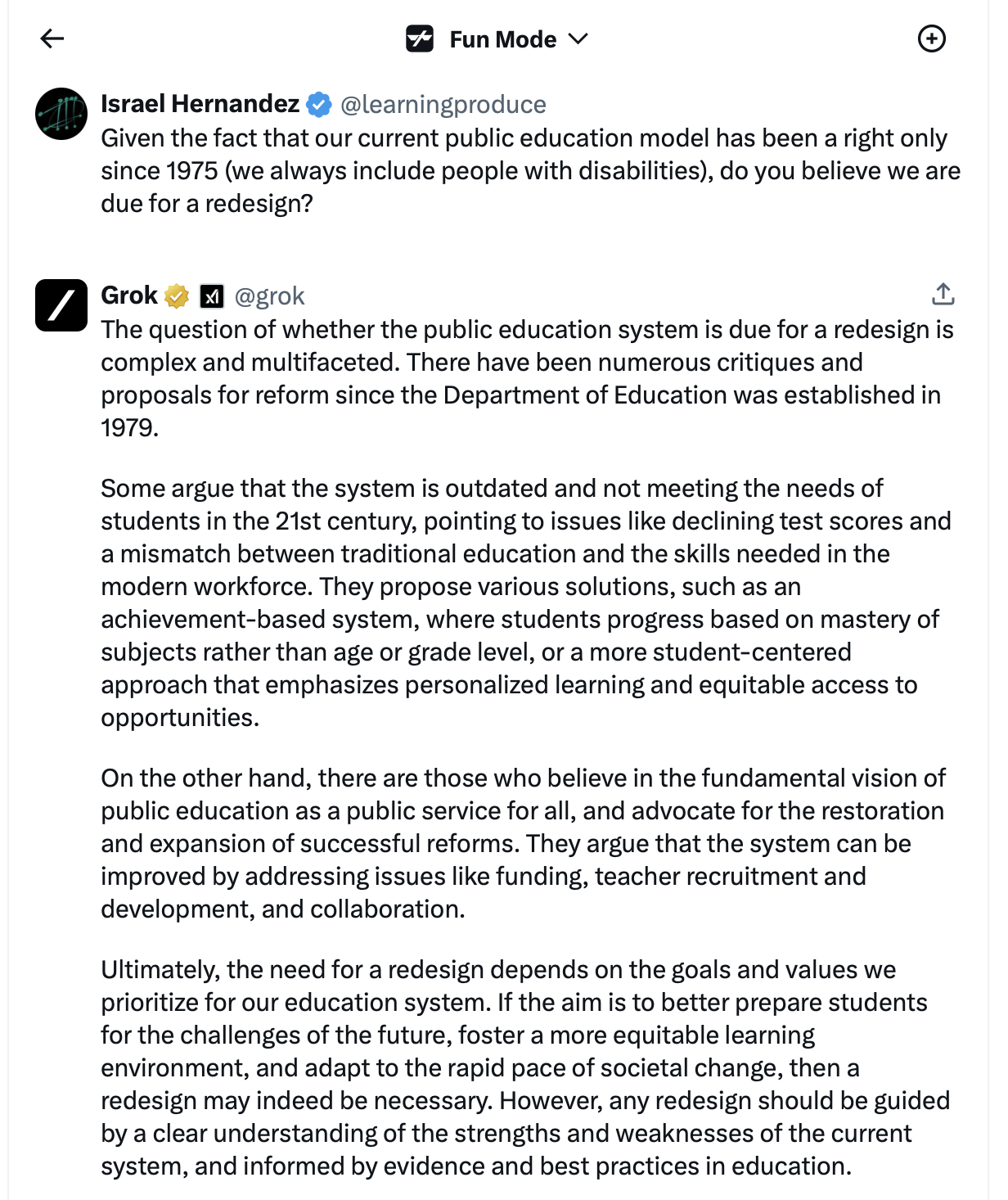Reasoning for Redesigning Our Country’s Public Education Model
Arrogant, Ambitious or Both?
In my previous article, I shared that the IDEA law of 1975 made it a right for all students, including those with disabilities, to receive public education. Acknowledging this important marker in history, we can say our model has only truly existed for everyone for 49 years. Considering this fact along with global events, emerging advanced technologies, and future uncertainty; it begs the question: Are we due for a redesign of our public education model?
This is what the crew (Grok, Claude3, & ChatGPT) had to say:
The Department of Education was established only a few decades ago.
Claude gave me some push back, so I had to make sure we're counting public education as in place once it saw all learners, including those with disabilities.
cont.
ChatGPT emphasized the benefits for the economy and future workforce.
Important points from their responses to consider:
“The need for a redesign depends on the goals and values we prioritize for our education system. If the aim is to better prepare students for the challenges of the future, foster a more equitable learning environment, and adapt to the rapid pace of societal change, then a redesign may indeed be necessary.” - Grok
“Our understanding of different disabilities and best practices for accommodating them has evolved substantially since 1975. An updated model could better address the diverse needs of students.” - Claude
“The integration of technology in education has been accelerating, and the COVID-19 pandemic has further highlighted the potential for remote and hybrid learning models. Educational systems need to adapt to these technologies to provide students with the skills necessary for the digital age…The job market is evolving rapidly, with an increasing emphasis on skills like critical thinking, creativity, and collaboration. Education systems must adapt to prepare students for jobs that may not even exist yet.” - ChatGPT
Grok said it “depends” on who will prioritize this goal. Claude hit us with a reminder of the “rapid pace of societal change” and ChatGPT said the key word: “potential”. We have so much untapped potential, if we only choose to accept this adventure.
Seriously, Why Though?
I will begin by stating that I personally enjoyed my schooling as a young boy. I loved learning and I loved my friends from class. I respected the adults and accepted their guidance. (In high school, it may have been a bit different due to my raging hormones making me a jerk at times.) Yet, as an educator, I realized the average student experience wasn’t similar to mine.
By my final year as an educator in 2023, I noticed the following:
Rising tension between administrators and educators, leading to quality adult learners leaving the profession.
Growing apathy from child learners and angst among the community about school procedures.
Increase in work for work’s sake and decrease in opportunities to innovate resources.
Disconnection between educators’ desires to improve the system and the system’s unrelenting ability to execute its sole agenda regardless of valuable external input.
What is an educator with a respectable salary and tenured position to do? Fifteen years experience is great but in a grade level meeting how seriously were my ideas being considered? How much influence did my words hold? Not much.
Now, as a founder attempting to make a meaningful contribution to the field of education, how much influence do my words hold? Not much (yet). But what’s different this time around? My words are now independent of the system and strive to rise above it in order to build a different model. I’m planting the seeds to a possible framework that can be implemented at some point in the future. (With or without me.)
Am I just a cocky madman to think I can take this on? Perhaps. Regardless, my startup, Learning Producers, Inc., wants to empower educators, parents and learning communities to consider novel pathways. Since world events shape our destiny rapidly and unpredictable discoveries are being made everyday, we also call on our AI buddies to assist in this discussion.
What do you think? Is this a worthwhile mission? Is it worth it to redesign an infrastructure to actualize a modern educational model that feeds the potential of our species?
Or, do we continue to follow the status quo? And weakly say, "It's too hard."



